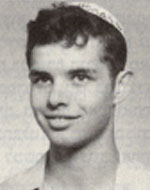Binyamin, son of Esther and Yehuda, was born on 6.11.1954 in Rehovot, where he studied at the Tachkemoni elementary school in his hometown and continued his studies at the Yeshiva High School, the “Nativ-Meir” yeshiva in Jerusalem, – “Har Etzion” settlement in Alon Shvut. Benjamin was particularly outstanding in sacred studies and in Hebrew, orally and in writing. At the same time, he was diligently preparing for the matriculation exams and was successful. And in particular received good grades in the Talmud and Jewish thought. His disciples and classmates greatly appreciated his diligence, his honesty, and his adherence to principles. According to one of his friends, “for him there was no separation between vision and its realization, between the head and the hand, between wisdom and action.” Benjamin aspired to impart to others the Torah he had learned, and regarded it as a precious treasure. He was fond of his friends and they affectionately called him “my son.” Benjamin was very active in the Bnei Akiva movement and eventually led the Rehovot branch and took part in the Gesher movement and founded a branch in Rehovot. His friends and apprentices say that “he had tremendous influence, first in the personal example he gave, and secondly in his work, which was expressed in his initiative to organize activities and guidance in the branch of the movement and with the help of a sincere advice to the centers.” He was also a partner in every action that stemmed from the love of the people and the country, and he participated in collecting donations for Russian Jewry through the sale of snowflakes at Netiv Meir during the break; In the activities of the Movement for the Greater Land of Israel, and in Ariel this is the movement to immigrate to the Temple Mount. He knew the history of the Yishuv and the history of the War of Independence, and was especially impressed by the underground movements that operated against the British government, from the figure of Lehi commander Avraham Stern (“Yair”) and from Rabbi Zvi Yehuda Kook . My son was lively and stormy, but he knew how to stop the storm in his Lev and to moderate his enthusiasm logically. He adhered stubbornly to the very truth, which was his guiding light, was very honest and carried in his Lev the innocence and vision of a civilized world. After completing his high school studies, he enrolled in the “Har Zion” hesder yeshiva in Gush Etzion, because he hoped to combine Torah study with the fulfillment of national duty and the realization of the vision of settling the Land of Israel. Benjamin was drafted into the IDF at the end of July 1972 and assigned to a Nahal unit. After basic training, he was sent to battalion training and later to the “Etzion” hesder yeshiva. In preparation for the High Holy Days, 5734 (1974), the military rabbinate sent him to the Suez Canal area to perform prayers on Rosh Hashana, and he liked the soldiers of the outposts, who did many for them and even volunteered for guard duty. After two days before Yom Kippur 1973, Benjamin was sent to the Milano post and when the outpost was attacked and his defenders were forced to retreat, Benjamin retreated with them. On October 8, 1973, during their retreat, the soldiers took shelter in an abandoned house in Qantara. The Egyptians opened fire on them and Binyamin was hurt and his tracks disappeared. He was considered missing until his body was found and he was brought to eternal rest in the cemetery in Rehovot. Survived by his parents and two sisters. After his fall, he was promoted to corporal. In a letter of condolence to the bereaved family, the commander of one of the outposts Benjamin wrote for him stated: “Immediately upon his appearance, my son impressed us all with his demand to fit in, first and foremost, as a soldier in Ma’oz, with all that involved, A sermon that would not shame any rabbi, and spoke about the connection between the people of Israel and the Land of Israel, and he caught up with us with his enthusiasm.”He will search for every teacher, educator and instructor, and even he is a” Tsukik “guide, educated advice in the laws and righteous trials of our people and in the words of the sanctity of our greatness. “” This is how we mourn our lives and thus we must grieve over the Temple: to seek continually ways to repair. We must search for the reasons for the destruction of our sins – and we must correct them. From here I develop an idea that we must correct ourselves and reach the desire for redemption in Jacob’s system. First, he cried a lot, and as a result, feeling the inferiority and feeling that Yosef was alive, he had the energy to look everywhere for a glimmer of hope and from heaven helped him. “The book also contains memoirs about Benjamin, Writes: “I found in him a gentle soul and an innocent faith, which is rare among young people. I saw him as a rising star. I also saw him as a very kind boy whom everyone who knew him had to love. “His friend in the youth movement writes:” G-d! Take one of your great sons. Please give us strength, that when we become weak and weak we will remember the image of my son, that shining figure who will illuminate the darkness of our lives, and we will be able to follow in his footsteps and sustain – ‘Follow you – Benjamin!’ (Judges 5:17). “
